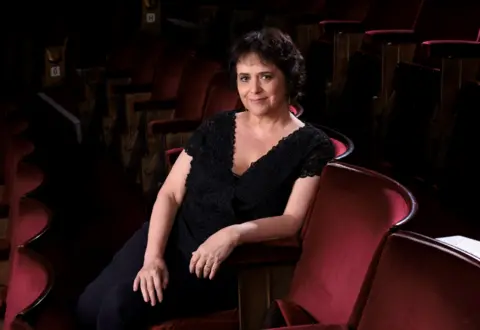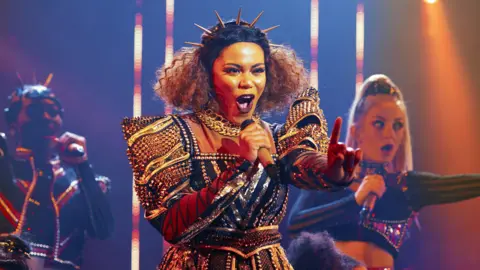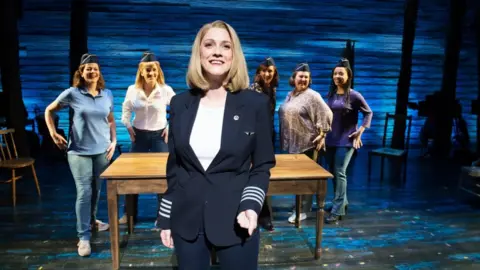Theatres 'ready to fight' after year 'from hell'
 Justin Griffiths-Williams
Justin Griffiths-Williams"We were walking innocently into the future with no idea what was coming," says Nica Burns, chief executive of Nimax Theatres.
On 16 March last year, she was watching a preview of the musical City of Angels that was due to open at the firm's Garrick Theatre.
"We knew we had something special," she said.
Within a couple of hours, cast and crew gathered in the bar for a sudden goodbye, sharing pizzas and drinks with colleagues they thought they would see in a few weeks' time.
That night, all theatres shut due to Covid-19. For most, their stages have been in darkness ever since.
"The last year for theatre has been hell... You couldn't have made it up in a play, a musical or a dream," Ms Burns told the BBC.
Like others, Nimax's costs have mounted but little cash has come in during lockdown.
A new survey by industry body UK Theatre found that 95% of 944 theatre venues, producers and businesses were worse off financially due to the pandemic. And 16 organisations reported losses of more than £5m in the last year.
In the last 18 months, Ms Burns estimates Nimax has made a loss of about £20m. At its peak last August, 339 staff members were on furlough.
It also suffered a number of false starts.
About 25,000 audience members managed to see a show when its theatres, which host Six and Everybody's Talking About Jamie, were allowed to reopen last Christmas. But closing them again under fresh lockdown restrictions cost £250,000.
 Eleanor Howarth
Eleanor HowarthDespite that, the theatre boss plans to reopen all six sites from 17 May at 50% capacity, under the government's "roadmap" for lifting restrictions.
With social distancing measures in place, Nimax theatres will either make a small loss or break even, Ms Burns says.
"For larger shows, such as Harry Potter or Hamilton - that just wouldn't be viable. They need to spend months marketing, see if cast are available, start rehearsals..."
But she says of her, mostly medium-sized, venues: "It is much better for us to be open, there's no doubt."
"With ticket sales coming in, we'll be making a contribution to overheads and will be able to avoid dipping into our reserves."
"But the other great thing about it is we can give a whole lot of people their jobs back," she adds.
Having cut down costs by renegotiating with suppliers, as well as making use of furlough and a £5m coronavirus business interruption loan, Ms Burns says the firm is on a "strong footing" coming out of the crisis.
"We had a very successful business brought to its knees - but we're ready to go out and fight."
'Devastating impact'
Julian Bird, the chief executive of the Society of London Theatre and UK Theatre, describes the pandemic's impact as "devastating" for firms across the country.
"We saw an existential threat come out of nowhere that has had a completely dramatic effect in shutting down our industry... an industry that relies on people coming into an auditorium, paying for a ticket and watching a production."
 UK Theatre
UK TheatreWithout government support such as the Culture Recovery Fund or business rates holidays for theatres, many more would have "gone to the wall".
But a lack of insurance for Covid-related cancellations means commercial producers and theatre owners have been left shouldering big financial risks coming out of lockdown.
UK Theatre is pushing for an "indemnity scheme" that would stand behind losses in the event of coronavirus-related shutdowns or cast or crew getting ill. A similar scheme exists for film and TV productions.
He points to the huge losses theatres and investors made in December when pantomimes and other shows closed due to rising Covid cases.
Without additional support, he says: "We won't see big shows, big UK tours coming back quickly - that's the big risk."
And the economic impact could be huge, Mr Bird argues.
"What you see on-stage is the product of many companies: the suppliers of sound, lighting, video technology, wig-makers, costumes - and that's a microcosm."
"We have our own ecosystem in the theatre world", which fits into a wider supply chain. It's estimated theatre generates more than £1.2bn in VAT for the Treasury from ticket sales, as well as related coach trips, hotel bookings and meals in restaurants.
Mr Bird is confident, though, that the show will go on, despite the last year being "incredibly difficult".
And the industry may face a shake-up on its return, due to a focus on the Black Lives Matter movement, as well as a "realisation a lot of people who make up the industry are self-employed or freelance," he says.
'I want the industry to come back - for good'
Alice Fearn watched the government coronavirus briefing on her phone as she travelled on the bus to the Phoenix Theatre in London's West End.
Last 16 March, the actress from South London was just five weeks into a year-long contract playing a lead role in the musical Come From Away.
Having seen that Broadway shows were forced to shut the week before, "that made me think we were next," she says.
 Craig Sugden
Craig SugdenThe cast gathered on-stage for a warm-up at the usual time of 18:15. "I had a full face of make-up, other girls had their hair in pin curls ready to get their wigs on," says Alice.
But the production was halted that evening due to the new Covid restrictions. One year on, Alice hasn't returned to the theatre and has used about half of her savings to pay bills.
Although she has been self-employed for a number of years, she was not eligible for Universal Credit or the government's Self-Employed Income Support Scheme because of her previous earnings in a higher-paying role, playing Elphaba in Wicked.
The Institute for Fiscal Studies estimates the same rule has disqualified about 225,000 people.
Despite being excluded from government support, Alice feels fortunate she has been able to make ends meet by giving talks at performing arts colleges and singing lessons.
"My career is completely theatre-based, or live gigging… I was part of a world where everything closed down... I made myself available for absolutely everything that came in."
While she's excited for the industry's return, she says: "I think the roadmap has given me more anxiety. How do we know it's real and going to exist the way it's written?
"None of us have done shows for a year. We need to market them, rehearse them... that's costly and if they are cancelled again that's just money down the drain.
"I want the industry to come back - but I want it back for good."
